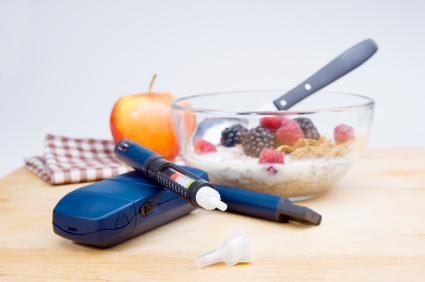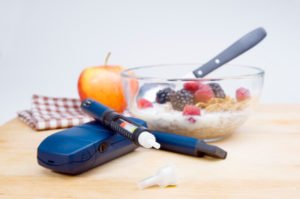Prevention is the best weapon against any disease, in the case of diabetes an important part of this prevention is related to the daily diet, this is a selection of 10 key points for perfect feeding in the fight against diabetes mellitus.
Controlling the level of glucose in blood
Always prefer low-glycemic foods, avoid simple sugars as far as possible without leading to an absolute prohibition, and choose those that do not contain sugar, like fructose, recommended consumption of whole grains and high fiber foods in general.
Maintain a healthy weight
Excess body fat makes it harder for people with type II diabetes to use its own insulin.
Balancing the proportion of food
Do not fall in protein diets, ketogenic or anywhere else that alters nutrient ratios recommended for a healthy person.
Protein should be a 15% of total calories, never being less than the total amount of protein intake to 0.75 g/day and high biological value, carbohydrates provide us at least 55-60% of total calories and lipids not exceed 30% of total caloric intake.
Achieve or maintain an adequate level of blood lipids
The distribution between different types of fat should be 10% saturated, 10% monounsaturated and 10% polyunsaturated. They avoid foods high in cholesterol, as diabetics, the close relationship between the metabolism of carbohydrates and lipids, are among the main groups at risk of cardiovascular disease (syndrome X or plurimetabolic).
Food should be fresh and minimally processed
Fresh fruit, whole grains, fresh vegetables, raw or steamed, natural yoghurt, etc., avoid prepared foods from shops, pastries and industrial ice cream, canned foods, snacks, in general all kinds of fast food or industrialized.
The power supply must provide an adequate amount of essential nutrients
Vitamins, minerals, essential fatty acids, etc.. The diet should be varied, so is more likely to get all the vitamins and minerals. Pay particular attention to levels of chromium and zinc, which are critical for insulin response.
Controlling drugs taken
Before taking any nonprescription drugs, vitamins or herbal facts, ask your pharmacist how they can affect your diabetes or prescription drugs you take. Always follow your doctor’s instructions regarding the dosage and frequency of any medications you are taking, never treat yourself.
Controlling sodium intake in the diet
The kidneys are usually affected organs in diabetics, due to extra work must be performed to remove excess ketone bodies are formed when there is no insulin, so that excess sodium can be very dangerous. Addition of sodium increases blood pressure and hypertension attends also associated with diabetes in most cases (syndrome X).
Promote normal growth in children
During maternity, pregnancy and breastfeeding of infants, an increased intake of proteins, essential amino acids, calcium, etc. in the mother’s diet should be taken into account.
On the other split for both babies and for infants, being in a phase of marked growth and development of structures, it is important that the diet contains sufficient nutrients.
Regular physical exercise
Exercise helps control weight, sweats sodium and eliminates toxins. It is necessary to foresee that glucose consumption is increased by making the muscles work.

